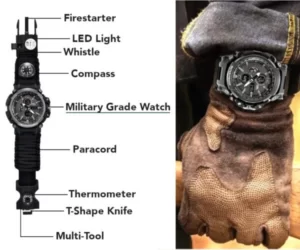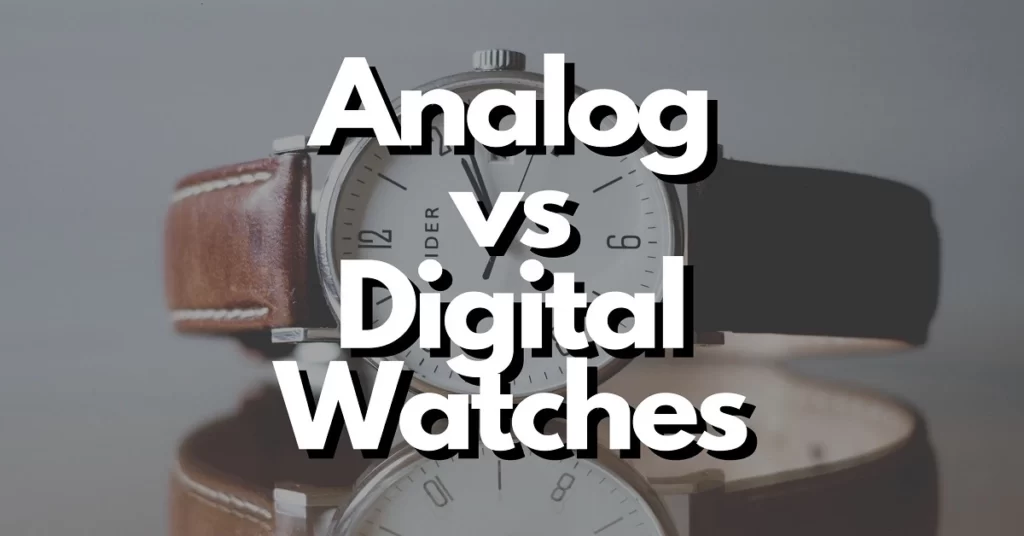Analog watches show you the time of day by using hands that rotate around a dial. Digital watches, however, display the time electronically by using digits.
Here are more key differences between analog and digital watches:
- Analog watches tend to be more traditional in design and may be considered more stylish or fashionable. They often have a classic, timeless look.
- Digital watches are generally more practical and functional, as they often have additional features such as stopwatches, alarms, and backlighting.
- Analog watches typically use a mechanical movement, which means they have small moving parts inside that work together to keep time. Digital watches use an electronic movement. This means they have a small computer chip that keeps track of the time.
- Analog watches may be more difficult to read quickly, as you have to interpret the position of the hands on the dial to determine the time. Digital watches are generally easier to read, as the time is displayed clearly in digits.
- Analog watches may be more durable, as they don’t have as many electronic components that can break or wear out. Digital watches may be more prone to malfunctions or battery issues.
- Analog watches may require more maintenance, as they have mechanical movements that need to be cleaned and oiled periodically to keep them running smoothly. Digital watches generally require less maintenance, as they have no mechanical parts that need to be serviced.


Which is better, Analog or Digital?
I have a hard time definitively saying which type of watch is “better”. It really depends on an individual’s personal preferences and needs. Some people may prefer an analog watch for their classic, stylish design. But other people might prefer a digital watch because of their practical features and easy-to-read displays.
Consider this when deciding which type of watch is right for you:
- Style: If you’re looking for a watch that makes a fashion statement, an analog watch with a stylish design may be the way to go. On the other hand, if you want a watch that is more functional and practical, a digital watch might be a better choice.
- Ease of use: If you want a watch that is easy to read and understand, a digital watch is likely the better choice. Digital watches display the time in clear, easy-to-read digits, so you can quickly check the time without having to interpret the position of the hands on a dial.
- Features: Digital watches often have additional features such as stopwatches, alarms, and backlighting, which may be useful for certain activities or situations. If you’re looking for a watch with these kinds of features, a digital watch is probably the way to go.
- Maintenance: Analog watches typically require more maintenance, as they have mechanical movements that need to be cleaned and oiled periodically. Digital watches, on the other hand, generally require less maintenance, as they have no mechanical parts that need to be serviced.
The decision of which type of watch is “better” for you will depend on your personal preferences and needs. It may be helpful to try out both types of watches.
Which one is more accurate?
Both analog and digital watches can be accurate, but the degree of accuracy can vary depending on a number of factors.
In general, analog watches with mechanical movements tend to be less accurate than digital watches. This is because mechanical movements rely on a series of small moving parts to keep time, and these parts can be affected by factors such as wear and tear, temperature changes, and the accuracy of the manufacturing process. As a result, mechanical watches may gain or lose time over the course of a day, and may require periodic adjustment to maintain their accuracy.
Digital watches, on the other hand, are typically more accurate than analog watches. This is because they use an electronic movement, which means they have a small computer chip that keeps track of the time. Electronic movements are generally more accurate than mechanical movements, as they are not affected by the same kinds of factors that can affect the accuracy of a mechanical movement.
That being said, the accuracy of both analog and digital watches can be influenced by a number of external factors, such as the quality of the watch itself, the environment in which it is used, and the accuracy of the time-keeping mechanism (e.g. atomic clock, GPS signal, etc.). Some high-end digital watches may be equipped with special time-keeping mechanisms that are extremely accurate, such as GPS or radio-controlled movements.
In general, if accuracy is a top priority for you, you may want to consider a digital watch with a high-quality movement or a special time-keeping mechanism. However, if you prefer the style and feel of an analog watch, there are also high-quality mechanical movements available that can offer good accuracy.
Conclusion
In conclusion, while there are notable differences between digital and analog watches, what’s important is up to you. You decide which one better fits your needs. There is no wrong answer. I hope this article was helpful and you will find more interesting things on this site.

